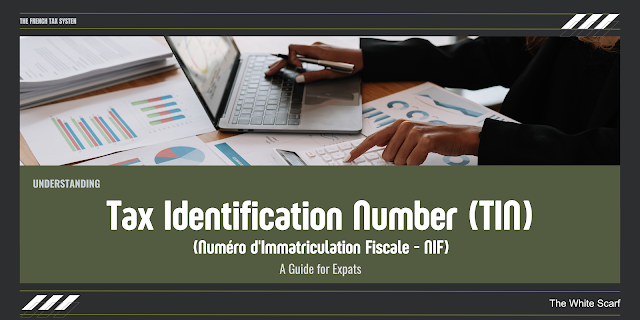Understanding the Tax Identification Number (TIN) in France: A Guide for Expats
When moving to a new country, there are several bureaucratic processes to navigate. One crucial step in France is obtaining a Tax Identification Number (TIN), known as Numéro d'Immatriculation Fiscale (NIF). This number plays a significant role in various administrative and financial aspects of your life in France. Whether you're starting a job, opening a bank account, or simply becoming a tax resident, getting your TIN is an essential step.
What is a Tax Identification Number (TIN)
A Tax Identification Number (TIN) is a unique identifier issued to individuals for tax purposes in France. It is used by the tax authorities to track and monitor your tax obligations. The TIN is necessary for several administrative tasks, such as filing taxes, receiving refunds, and establishing your residency status. For foreign nationals, it's especially important as it allows them to access various public services and financial services in the country.
In France, the TIN is typically a 13-digit number. If you are a foreign national or resident, you will be issued a TIN after registering with the French tax system.
Why is the Tax Identification Number (TIN) Important
The TIN serves several critical functions in the French system:
- Tax Filing: It allows the French tax authorities to track your income and tax obligations. Without it, you cannot file taxes in France.
- Employment: If you start a job in France, the TIN is needed for your employer to report your income and pay taxes on your behalf.
- Banking: To open a bank account in France, banks will request your TIN to verify your identity and residency status.
- Social Services: The TIN is required to access social services, including health insurance and social security benefits.
- Financial Transparency: It ensures transparency in your financial activities, which is essential for your legal and financial standing in France.
How to Get a Tax Identification Number (TIN) in France
Obtaining a TIN in France is a straightforward process, but it requires specific steps depending on your residency status. Here's how you can get one:
- For French Citizens: French nationals typically have a TIN, which is automatically assigned when they are born or when they first register in the country.
- For Foreign Nationals: As an expatriate, you need to register with the French tax office (Centre des Impôts) to obtain your TIN. You can apply online, by mail, or in person at your local tax office.
- Documents Required:
- Passport or national ID card
- Proof of address (such as a utility bill or lease agreement)
- Your marriage certificate, if applicable (to confirm your French connection)
- For Married Couples: If you're married to a French citizen, you may be able to apply jointly or as a household, depending on your status.
For more details, you can visit the official French government website on taxation: service-public.fr.
Facts
- International Recognition: The French TIN is recognized internationally, which makes it essential for cross-border financial activities.
- Digital Services: The French tax authorities offer digital services to make the application process easier. You can use the impots.gouv.fr website to manage your taxes, and the TIN will be required for accessing online services.
- Impact on Social Security: Having a TIN ensures that you are correctly registered for social security, which includes health insurance, pensions, and unemployment benefits.
Case Study
My Experience as a Thai Expat in France
Let’s take a look at a real-life case study to understand the process better.
I am originally from Thailand and recently got married to a French citizen. After relocating to France, one of the first things I needed to do was get a Tax Identification Number (TIN). Here's the step-by-step process I followed:
-
Register with the Local Tax Office: I went to the Centre des Impôts near our new home. Since I am married to a French citizen, the process was relatively straightforward. I had to bring my passport, my marriage certificate, and proof of our address in France (like a recent utility bill).
-
Fill Out the Form: The tax office provided me with a registration form (Cerfa form). It took a few minutes to fill out, and I had to indicate that I was a resident of France, which was required for tax purposes.
-
Wait for the TIN: Within a couple of weeks, I received my TIN by mail. It arrived along with other registration details, including instructions on how to file taxes online and what to do next for social services registration.
-
Update Bank and Employment Information: Once I had my TIN, I went to the bank to open a French bank account and informed my employer about my new tax status. Both required the TIN for official records.
Overall, the process was simple but crucial for becoming integrated into the French system. It enabled me to access a variety of services, from opening a bank account to getting health coverage, all of which required my TIN.
Conclusion
Obtaining a Tax Identification Number (TIN) in France is an essential step in managing your taxes and accessing various services. Whether you are an expat or a French citizen, the TIN ensures that you are legally recognized by the French government and facilitates your integration into the country’s financial and social systems. If you are relocating to France, especially through marriage or other family ties, make sure to get your TIN as soon as possible to avoid any administrative hassles.
For more information and updates, check out official websites like impots.gouv.fr and service-public.fr.
You may like
Read more:
💙 Understanding the French Tax System: A Guide for Expats (Updated for 2025)


